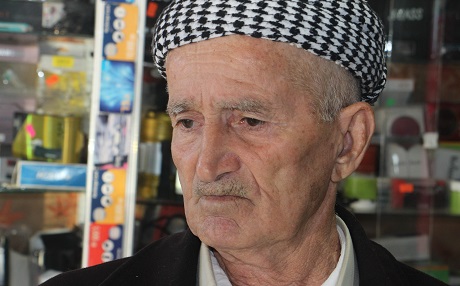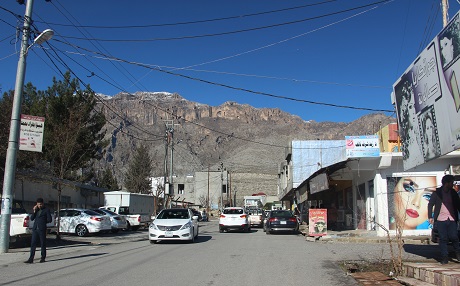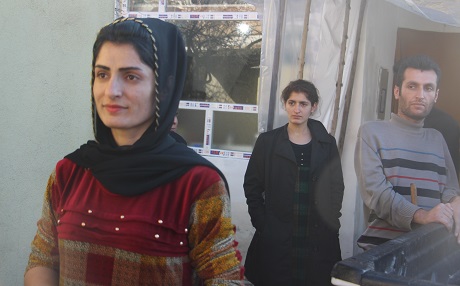SHILADZE, Kurdistan Region – Moved from their homes by Saddam Hussein, hemmed in by tribal lines, ignored by the government, collateral damage of a war between the PKK and Turkey, the people of Shiladze are angry.
This anger boiled over last month when hundreds stormed a nearby Turkish army base. Two protesters were killed in the altercation.
The protest on January 26 was sparked by civilian deaths in Turkish airstrikes against alleged PKK positions. Six civilians had been killed in the week before the protest, the latest in dozens of deaths as Turkey and the PKK wage their war in the Kurdistan Region.
- Anger has long been brewing -
The town was a small village until 1979 when Saddam Hussein, as part of his policies to crack down on the restive Kurds, forced residents of 130 villages to relocate to the agriculturally rich lands of Shiladze on the banks of the Great Zab River in the shadows of Duhok’s Zagros Mountains.
Today, some 50,000 people call Shiladze home. With that population, it ought to have the services and resources of an urban centre, but locals say they have been neglected by the Kurdistan Regional Government (KRG).
"We are in a prison," Haji Ehmen Huray, 78, told Rudaw on Sunday of life in Shiladze.
A veteran Peshmerga, Huray was sitting on a chair in the sun, watching the morning business in the bazaar.
Veteran Peshmerga Haji Ehmen Huray says the people in Shiladze are in ‘a prison.’ Photo: Hevidar Alikhan/Rudaw
"I fought in every corner of Kurdistan to have a free Kurdistan, and now I'm not free," he said.
The town is boxed in, he explained, with different tribes to the east and south that prevent people from Shiladze from accessing resources or land. Additionally, the PKK presence prevents residents from farming lands to the north.
"We have only the sky and it is out of reach,” lamented Huray.
The list of grievances in Shiladze is long.
"There is not enough space for living," said Sameer Murad Muhammed, 40, who works in real estate.
Every family has grown three- or four-fold since the 1990s, but the town has not been able to expand physically, surrounded by land controlled by other tribes or the PKK.
"The people of the town are suffering in rented housing and small houses," said Muhammed.
Some 50,000 people live in the town of Shiladze, Duhok province. Photo: Hevidar Alikhan/Rudaw
Land is expensive to buy — $20,000 for 200 square-metres, according to Muhammed — and out of reach for the town that suffers from high unemployment.
"There are no job vacancies here," said Salim Hassan Abdulqadir, 24, newly graduated from university.
He was standing outside the door of a school with a group of recent graduates. They are unable to get contracts and earn just 4,000 dinar ($3.35) an hour teaching irregularly.
The population also has outgrown the schools.
"Every class has 40-47 students in my school," said primary school teacher Emad Othman, 37. They have no computers and few books, he explained. Students have to make photocopies of the lessons.
The healthcare sector is similarly understaffed and underfunded.
At the Shiladze Healthcare Centre, manager Azad Qadir Khursheed said they are able to only treat minor ailments. For everything else, "we have to send patients to Amedi or Duhok."
Ramzya Muhammed Bayto, 40, says she has had problems with her eyes since she was a child, so she must travel for healthcare.
"I have never been treated here in my town. I cannot even get eye drops," she said.
Student Tazya Jalal Haji says she is angry about the poverty and cultural restrictions on girls and women in Shiladze. Photo: Hevidar Alikhan/Rudaw
Tazya Jalal Haji, a high school student, was explaining her frustration about the poverty and restrictions on girls and women. Asked why she was upset, she replied, “Because I'm angry for my people."
- Who to blame? -
The bulk of this anger is directed towards the government in Erbil.
Erbil dramatically cut its funding of projects across the Kurdistan Region while it grappled with a five-year-long financial crisis that it is just now emerging from. Officials are optimistic they will start getting back on track this year after patching up relations with Baghdad.
But a week and a half ago, Shiladze’s protest condemning Turkish airstrikes exploded into a rage about years of feeling neglected. Hundreds of unarmed protesters were desperate enough to storm a military base of the Turkish army.
The base was a target for two reasons, locals say. Yes, there is anger over the airstrikes, but they also see the KRG and Turkey as closely linked.
The KRG has blamed the PKK for drawing Turkish fire into the Kurdistan Region and has called on the group to stop using Kurdistan Region territory to target Turkish forces.
Irrespective of the Turkey-PKK conflict, the people of Shiladze expect more from their government.
Huray, the veteran Peshmerga, feels abandoned by the nation he fought for.
"I have fought under every rock for the nation and now all the rocks are thrown at me,” he explained.
This anger boiled over last month when hundreds stormed a nearby Turkish army base. Two protesters were killed in the altercation.
The protest on January 26 was sparked by civilian deaths in Turkish airstrikes against alleged PKK positions. Six civilians had been killed in the week before the protest, the latest in dozens of deaths as Turkey and the PKK wage their war in the Kurdistan Region.
- Anger has long been brewing -
The town was a small village until 1979 when Saddam Hussein, as part of his policies to crack down on the restive Kurds, forced residents of 130 villages to relocate to the agriculturally rich lands of Shiladze on the banks of the Great Zab River in the shadows of Duhok’s Zagros Mountains.
Today, some 50,000 people call Shiladze home. With that population, it ought to have the services and resources of an urban centre, but locals say they have been neglected by the Kurdistan Regional Government (KRG).
"We are in a prison," Haji Ehmen Huray, 78, told Rudaw on Sunday of life in Shiladze.
A veteran Peshmerga, Huray was sitting on a chair in the sun, watching the morning business in the bazaar.
Veteran Peshmerga Haji Ehmen Huray says the people in Shiladze are in ‘a prison.’ Photo: Hevidar Alikhan/Rudaw
"I fought in every corner of Kurdistan to have a free Kurdistan, and now I'm not free," he said.
The town is boxed in, he explained, with different tribes to the east and south that prevent people from Shiladze from accessing resources or land. Additionally, the PKK presence prevents residents from farming lands to the north.
"We have only the sky and it is out of reach,” lamented Huray.
The list of grievances in Shiladze is long.
"There is not enough space for living," said Sameer Murad Muhammed, 40, who works in real estate.
Every family has grown three- or four-fold since the 1990s, but the town has not been able to expand physically, surrounded by land controlled by other tribes or the PKK.
"The people of the town are suffering in rented housing and small houses," said Muhammed.
Some 50,000 people live in the town of Shiladze, Duhok province. Photo: Hevidar Alikhan/Rudaw
Land is expensive to buy — $20,000 for 200 square-metres, according to Muhammed — and out of reach for the town that suffers from high unemployment.
"There are no job vacancies here," said Salim Hassan Abdulqadir, 24, newly graduated from university.
He was standing outside the door of a school with a group of recent graduates. They are unable to get contracts and earn just 4,000 dinar ($3.35) an hour teaching irregularly.
The population also has outgrown the schools.
"Every class has 40-47 students in my school," said primary school teacher Emad Othman, 37. They have no computers and few books, he explained. Students have to make photocopies of the lessons.
The healthcare sector is similarly understaffed and underfunded.
At the Shiladze Healthcare Centre, manager Azad Qadir Khursheed said they are able to only treat minor ailments. For everything else, "we have to send patients to Amedi or Duhok."
Ramzya Muhammed Bayto, 40, says she has had problems with her eyes since she was a child, so she must travel for healthcare.
"I have never been treated here in my town. I cannot even get eye drops," she said.
Student Tazya Jalal Haji says she is angry about the poverty and cultural restrictions on girls and women in Shiladze. Photo: Hevidar Alikhan/Rudaw
Tazya Jalal Haji, a high school student, was explaining her frustration about the poverty and restrictions on girls and women. Asked why she was upset, she replied, “Because I'm angry for my people."
- Who to blame? -
The bulk of this anger is directed towards the government in Erbil.
Erbil dramatically cut its funding of projects across the Kurdistan Region while it grappled with a five-year-long financial crisis that it is just now emerging from. Officials are optimistic they will start getting back on track this year after patching up relations with Baghdad.
But a week and a half ago, Shiladze’s protest condemning Turkish airstrikes exploded into a rage about years of feeling neglected. Hundreds of unarmed protesters were desperate enough to storm a military base of the Turkish army.
The base was a target for two reasons, locals say. Yes, there is anger over the airstrikes, but they also see the KRG and Turkey as closely linked.
The KRG has blamed the PKK for drawing Turkish fire into the Kurdistan Region and has called on the group to stop using Kurdistan Region territory to target Turkish forces.
Irrespective of the Turkey-PKK conflict, the people of Shiladze expect more from their government.
Huray, the veteran Peshmerga, feels abandoned by the nation he fought for.
"I have fought under every rock for the nation and now all the rocks are thrown at me,” he explained.






Comments
Rudaw moderates all comments submitted on our website. We welcome comments which are relevant to the article and encourage further discussion about the issues that matter to you. We also welcome constructive criticism about Rudaw.
To be approved for publication, however, your comments must meet our community guidelines.
We will not tolerate the following: profanity, threats, personal attacks, vulgarity, abuse (such as sexism, racism, homophobia or xenophobia), or commercial or personal promotion.
Comments that do not meet our guidelines will be rejected. Comments are not edited – they are either approved or rejected.
Post a comment